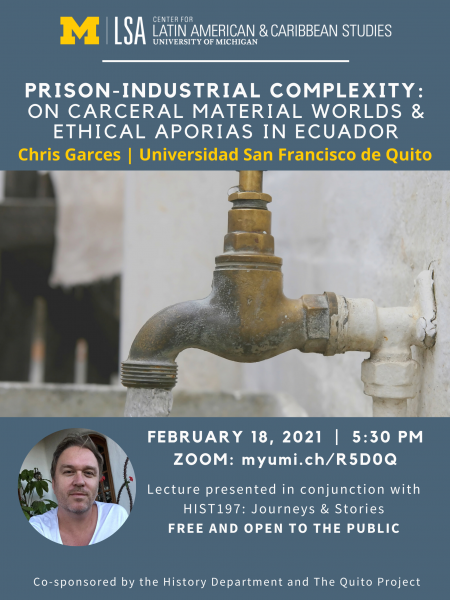The Center for Latin American and Caribbean Studies (LACS) together with the Brazil Initiative at LACS feature presenters from diverse disciplines. LACS organizes and sponsors more than 50 public lectures, workshops, performances, and conferences over the course of the academic year.
In addition to our yearly programming, the Center for Latin American and Caribbean Studies (LACS) and the Brazil Initiative at LACS are happy to consider funding requests to co-sponsor lectures, events, performances, and activities that coincide with the center's mission to promote a broad and deep understanding of the region. Request to co-sponsor an event »
LACS Event. Prison-Industrial Complexity: On Carceral Material Worlds & Ethical Aporias in Ecuador
Chris Garces, research professor, Universidad San Francisco de Quito

Thursday, February 18, 2021
5:30-7:00 PM
Virtual
Virtual Event. Register at
http://myumi.ch/R5D0Q
Chris Garces is Research Professor at Universidad San Francisco de Quito, and a Visiting Invited Professor in the Law School at Universidad Andina Simón Bolívar, Ecuador. His ethnographic interests range from the study of politics and religion—or contemporary political theologies–to the Western outgrowth of penal state politics, and counter-histories of Catholic ethics in Latin America. His co-edited volume, Carceral Communities in Latin America: Troubling Prison Worlds in the 21st Century (Palgrave Studies in Prisons and Penality), will be published in February 2021.
Everywhere it seems, democracy has been freighted with the psychic weight of punitive infrastructure. Symptomatically, for most citizens, a world without prisons is impossible even to imagine. But consider the flip side of this most curious problem: uncomfortable or intrusive memories—that in the name of enforcing justice and democratic order, living human beings are being held in cages—publicly forgotten almost as soon as they are remembered. The prison is a machine for disappearing humans and remaking worlds. Carcerality as such boxes the prisoner into what might be called ethical aporias, unrelenting state-imposed sacrifice and civil disregard, or an experimental process of human disposal which nevertheless demands increasingly accelerated flows of exchange between free citizens and dehumanized offenders. In this talk, I explore how even the most modest of prison technologies participate in penal infrastructure’s human unmaking and world-remaking processes. Taking into account Ecuador’s 20th century material history of a humble water spigot in a municipal prison, I demonstrate the perverse tenacity of carceral relations and how penality itself—the state-sponsored ritual reproduction of punishment across the prison-neighborhood nexus—involves continuous, albeit disavowed human experimentation on diverse citizen-subjects.
Lecture presented in conjunction with HIST197: Journeys & Stories
FREE AND OPEN TO THE PUBLIC.
Co-sponsors: Department of History, Prison Creative Arts Project, and The Quito Project
---
If there is anything we can do to make this event accessible to you, please contact us. Please be aware that advance notice is necessary as some accommodations may require more time for the university to arrange. Contact alanarod@umich.edu
Chris Garces is Research Professor at Universidad San Francisco de Quito, and a Visiting Invited Professor in the Law School at Universidad Andina Simón Bolívar, Ecuador. His ethnographic interests range from the study of politics and religion—or contemporary political theologies–to the Western outgrowth of penal state politics, and counter-histories of Catholic ethics in Latin America. His co-edited volume, Carceral Communities in Latin America: Troubling Prison Worlds in the 21st Century (Palgrave Studies in Prisons and Penality), will be published in February 2021.
Everywhere it seems, democracy has been freighted with the psychic weight of punitive infrastructure. Symptomatically, for most citizens, a world without prisons is impossible even to imagine. But consider the flip side of this most curious problem: uncomfortable or intrusive memories—that in the name of enforcing justice and democratic order, living human beings are being held in cages—publicly forgotten almost as soon as they are remembered. The prison is a machine for disappearing humans and remaking worlds. Carcerality as such boxes the prisoner into what might be called ethical aporias, unrelenting state-imposed sacrifice and civil disregard, or an experimental process of human disposal which nevertheless demands increasingly accelerated flows of exchange between free citizens and dehumanized offenders. In this talk, I explore how even the most modest of prison technologies participate in penal infrastructure’s human unmaking and world-remaking processes. Taking into account Ecuador’s 20th century material history of a humble water spigot in a municipal prison, I demonstrate the perverse tenacity of carceral relations and how penality itself—the state-sponsored ritual reproduction of punishment across the prison-neighborhood nexus—involves continuous, albeit disavowed human experimentation on diverse citizen-subjects.
Lecture presented in conjunction with HIST197: Journeys & Stories
FREE AND OPEN TO THE PUBLIC.
Co-sponsors: Department of History, Prison Creative Arts Project, and The Quito Project
---
If there is anything we can do to make this event accessible to you, please contact us. Please be aware that advance notice is necessary as some accommodations may require more time for the university to arrange. Contact alanarod@umich.edu
| Building: | Off Campus Location |
|---|---|
| Location: | http://myumi.ch/R5D0Q |
| Event Link: | |
| Website: | |
| Event Type: | Lecture / Discussion |
| Tags: | Area Studies, Center For Latin American And Caribbean Studies, Discussion, History, Latin America, Lecture, Politics, Social, Social Sciences, Virtual |
| Source: | Happening @ Michigan from Center for Latin American and Caribbean Studies, International Institute, Prison Creative Arts Project, The, Department of History |

